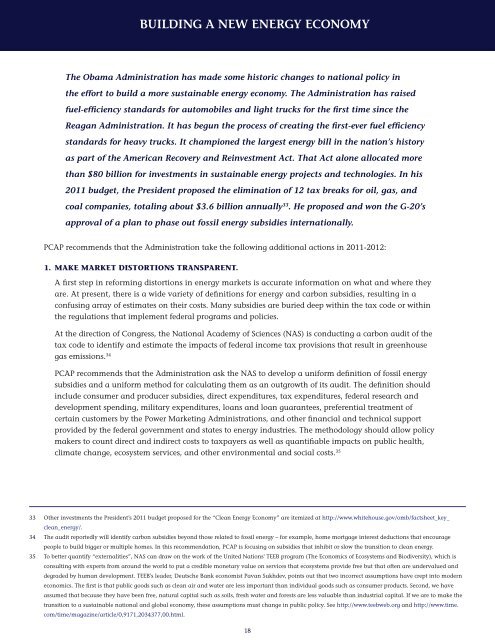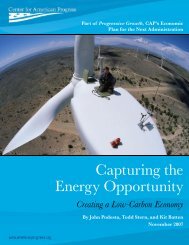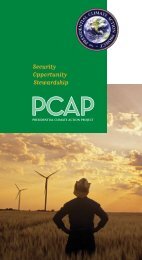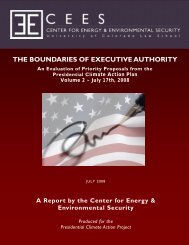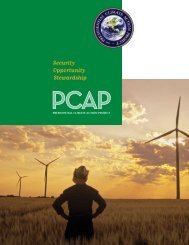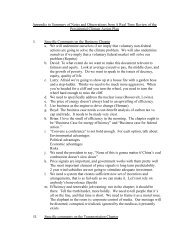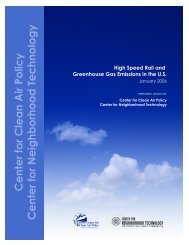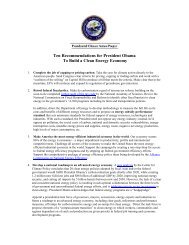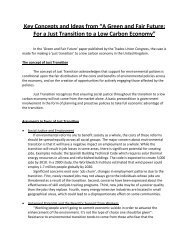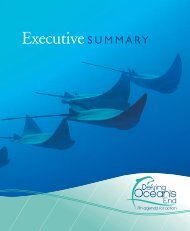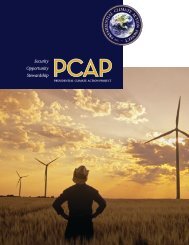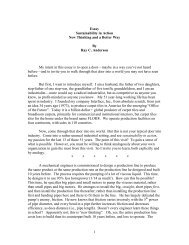The 2011 Plan - Presidential Climate Action Project
The 2011 Plan - Presidential Climate Action Project
The 2011 Plan - Presidential Climate Action Project
You also want an ePaper? Increase the reach of your titles
YUMPU automatically turns print PDFs into web optimized ePapers that Google loves.
BUILDING A NEW ENERGY ECONOMY<strong>The</strong> Obama Administration has made some historic changes to national policy inthe effort to build a more sustainable energy economy. <strong>The</strong> Administration has raisedfuel-efficiency standards for automobiles and light trucks for the first time since theReagan Administration. It has begun the process of creating the first-ever fuel efficiencystandards for heavy trucks. It championed the largest energy bill in the nation’s historyas part of the American Recovery and Reinvestment Act. That Act alone allocated morethan $80 billion for investments in sustainable energy projects and technologies. In his<strong>2011</strong> budget, the President proposed the elimination of 12 tax breaks for oil, gas, andcoal companies, totaling about $3.6 billion annually 33 . He proposed and won the G-20’sapproval of a plan to phase out fossil energy subsidies internationally.PCAP recommends that the Administration take the following additional actions in <strong>2011</strong>-2012:1. MAKE MARKET DISTORTIONS TRANSPARENT.A first step in reforming distortions in energy markets is accurate information on what and where theyare. At present, there is a wide variety of definitions for energy and carbon subsidies, resulting in aconfusing array of estimates on their costs. Many subsidies are buried deep within the tax code or withinthe regulations that implement federal programs and policies.At the direction of Congress, the National Academy of Sciences (NAS) is conducting a carbon audit of thetax code to identify and estimate the impacts of federal income tax provisions that result in greenhousegas emissions. 34PCAP recommends that the Administration ask the NAS to develop a uniform definition of fossil energysubsidies and a uniform method for calculating them as an outgrowth of its audit. <strong>The</strong> definition shouldinclude consumer and producer subsidies, direct expenditures, tax expenditures, federal research anddevelopment spending, military expenditures, loans and loan guarantees, preferential treatment ofcertain customers by the Power Marketing Administrations, and other financial and technical supportprovided by the federal government and states to energy industries. <strong>The</strong> methodology should allow policymakers to count direct and indirect costs to taxpayers as well as quantifiable impacts on public health,climate change, ecosystem services, and other environmental and social costs. 3533 Other investments the President’s <strong>2011</strong> budget proposed for the “Clean Energy Economy” are itemized at http://www.whitehouse.gov/omb/factsheet_key_clean_energy/.34 <strong>The</strong> audit reportedly will identify carbon subsidies beyond those related to fossil energy – for example, home mortgage interest deductions that encouragepeople to build bigger or multiple homes. In this recommendation, PCAP is focusing on subsidies that inhibit or slow the transition to clean energy.35 To better quantify “externalities”, NAS can draw on the work of the United Nations' TEEB program (<strong>The</strong> Economics of Ecosystems and Biodiversity), which isconsulting with experts from around the world to put a credible monetary value on services that ecosystems provide free but that often are undervalued anddegraded by human development. TEEB’s leader, Deutsche Bank economist Pavan Sukhdev, points out that two incorrect assumptions have crept into moderneconomics. <strong>The</strong> first is that public goods such as clean air and water are less important than individual goods such as consumer products. Second, we haveassumed that because they have been free, natural capital such as soils, fresh water and forests are less valuable than industrial capital. If we are to make thetransition to a sustainable national and global economy, these assumptions must change in public policy. See http://www.teebweb.org and http://www.time.com/time/magazine/article/0,9171,2034377,00.html.18


